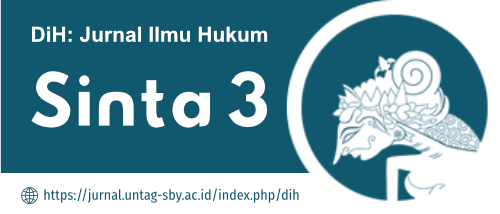PERTANGGUNGJAWABAN DOKTER DAN RUMAH SAKIT AKIBAT TINDAKAN MEDIS YANG MERUGIKAN DALAM PERSPEKTIF UU No 44 Th 2009 TENTANG RUMAH SAKIT
DOI:
https://doi.org/10.30996/dih.v7i14.263Abstract
Technology improvements and globalization invokes people’s realization about their rights as patients in a hospital. They begin to demand getting those rights and when unsatisfied,  they may sue their doctors and the hospital. These litigation cases will, in the end, increase doctor’s and hospital’s risks. Increased risk means increased cost. It is mentioned in the forty sixth clause of the Hospital Law (Undang-Undang Nomor 44 Tahun 2009 tentang Rumah Sakit) that the hospital bears the responsibility of the mistakes done by it’s health workers. This clause seems unfair in taking the side of erroneous health workers, including doctors, and may result in the decrease of doctor’s feeling of responsibility in their patients. Being a corporation, a hospital can not being punished and so the responsibility falls on it’s owner and management. This can be seen as a violation of the human rights law against the hospital owner and management. The yudicial implications of a doctor’s mistakes in the process of taking care of their patients must be seen from the ethical and the law aspect. Seen from the ethical aspect, a doctor has to fulfill many requirements as a doctor. Seen from the law aspect, a doctor’s mistakes has to fulfill the criminal law, the civil law, and the administrative law. Doctor-patient relationships are usually inspanningsverbintenis (expedient relationship). In order to be able to sue their doctor, a patient has to provide provable evidence about the presence of mistakes or negligences made by the doctor, not just the absence of cure. Doctor-patient-hospital relationship is a tripartit relationship based on agreements between the three parties. Each party is entitled to his rights and obligations. A harmonious relationship and good communication between hospital, doctor and patient plays an important role in the prevention of medical litigations againts doctors and hospitals. Practicing dokctors have to realize that they better apply good responsibility by obeying the rules stated in the professional ethics and the law, always strive to increase their service, and master the art of good communication. Hospitals need to apply optimal service as required by the law by applying programs such hospital accreditation and patient safety programs. Medical committee need to be empowered to carry out is’s tasks, especially in credentialing, recredentialing, medical audit, and enforcing medical professional discipline and good clinical governance.Downloads
References
Anikmah, 2008, Pengaruh Kepemimpinan Transformasional dan Motivasi Kerja Terhadap Kinerja Karyawan (Survey Pada PT. Jati Agung Arsitama Grogol Suko-harjo), Skripsi, Tidak Diterbitkan, Fakul-tas Ekonomi, Universitas Muhammadiyah Surakarta.
Anoraga, P. 2004. Psikologi Kepemim-pinan. Jakarta: Penerbit Rineka Cipta.
Anwar Prabu Mangkunegara, 2002, Mana-jemen Sumber Daya Manusia, Rema-ja Rusda, Bandung
As’ad, M, 1999, Psikologi Industri, Edisi IV, Liberty, Yogyakarta
Baker G.A., & Associates, 1992, Cultural Leadership: Inside America’s Commu-nity Colleges, Washington DC: Ameri-can Association of Community and Junior Colleges
Barley S., Meyer G., dan Gosh D., 1998, “Cultures of Culture: Academics, Prac-titioners, and the Pragmatics of Norma-tive Controlâ€, Administrative Science Quarterly, 33 : 24-60.;
Bass, B.M dan Avolio, 1990, “The Impli-cations of Transaksional and Transfor-mationalâ€, Team and Organization Development, 4, p.231- 273
Bass, B.M. dan Avolio, 1997, “Does The Transactional–Transformational Leader-ship Paradigm Transcend Organizational and National Boundaries?â€, Journal Ame-rican Psychologist, 52: 130-139
Burns J. M., 1978, Leadership, New York: Harper & Row
Clugston M., 2000, “The Mediating Effect of Multidimensional Comitment on Job Satisfaction an Intent to Leave,†Journal of Organisational Behavior, 21 (4) : 477 – 486.
Dessler, Gary. 1982. Manajemen Sumber Daya Manusia. Alih bahasa: Eli Tanya. Penyunting Bahasa: Budi Supri-yanto. Jakarta: Indeks
Downloads
Published
Issue
Section
License
Authors who publish with DiH: Jurnal Ilmu Hukum agree to the following terms:
- Authors transfer the copyright and grant the journal right of first publication with the work simultaneously licensed under a CC BY-SA 4.0 that allows others to share the work with an acknowledgement of the work's authorship and initial publication in this journal.
- Authors are able to enter into separate, additional contractual arrangements for the non-exclusive distribution of the journal's published version of the work (e.g., post it to an institutional repository or publish it in a book), with an acknowledgement of its initial publication in this journal.
- Authors are permitted and encouraged to post their work online (e.g., in institutional repositories or on their website) prior to and during the submission process, as it can lead to productive exchanges, as well as earlier and greater citation of published work (See The Effect of Open Access)










